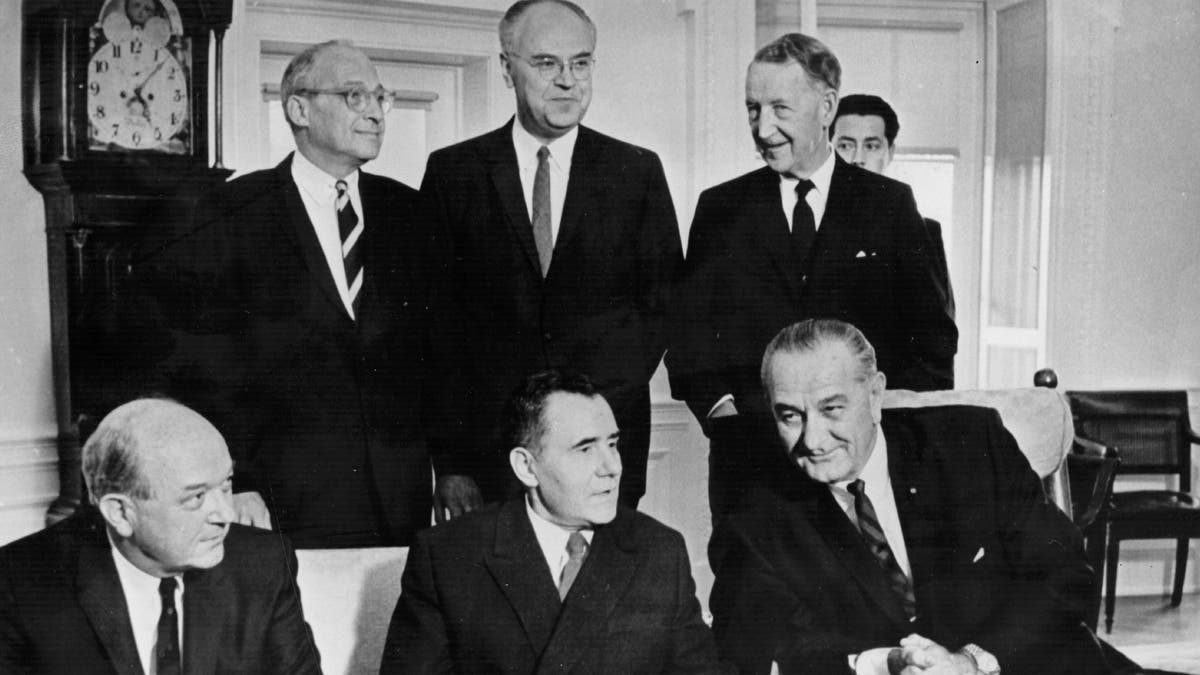
Lyndon Baines Johnson (1908 - 1973) 36th President of America seen here in the White House, with Secretary of State Dean Rusk (1909 - 1994), Russian Soviet foreign minister Andrei A. Gromyko (1909 - 1989), National Security Advisor Walt Rostow (1916 - 2003), Soviet ambassador Anatoly Dobrynin, and Llewellyn E. Thompson (1904 - 1972), October 13, 1966. (Photo by Central Press/Getty Images)
For a young man, Air Force Major John Pustay had already accomplished a lot. The New Jersey native had served as a military officer in South Korea and Japan, earned a doctorate and taught at the U.S. Air Force Academy. Although only one military officer had made it into the first class of fifteen White House Fellows in 1965, he decided to apply to the prestigious program anyway. After a grueling selection process, he was chosen in 1966. He was assigned to work for Secretary of State Dean Rusk.
President Johnson opened a window for Pustay to witness firsthand how our nation’s top leaders personally cope with the burdens of immense responsibility, impossible expectations and often-brutal public criticism
In his first month as a Fellow, Secretary Rusk sent him to the Oval Office to take notes for him at an impromptu meeting between President Lyndon Johnson and some of his most trusted foreign policy advisors. The Vietnam War was in full swing and the meeting was to discuss our response to an insurrection within South Vietnam’s leadership, and to select bombing targets in North Vietnam. Pustay recalled the small group huddled around LBJ: Secretary of Defense Robert McNamara, National Security Advisor McGeorge Bundy, Director of Central Intelligence Richard Helms, and General Earle Wheeler, the Chairman of the Joint Chiefs of Staff. The young major listened intently and took notes so he could give Secretary Rusk a proper briefing on the important meeting. “So everybody leaves, and I am the junior guy so I am going to be the last guy out,” Pustay recalled “And as I’m leaving the president taps me on the shoulder and he says, ‘Would you like to have a bourbon and branch water?’ I didn’t know what the heck branch water was, but if the Commander in Chief asks you to have bourbon and branch water, you probably ought to do it.”
The president summoned a steward who produced a bottle of bourbon and a pitcher of clear liquid. Pustay discovered – much to his relief – that “branch water” is just a Southern term for fresh water. The two men settled onto the sofa in the Oval Office, Pustay sipping his bourbon, the president his scotch and soda, while engaging in small talk for almost an hour. During a lull in the conversation, Pustay swirled the amber liquid in his glass and marveled at the fact that he was actually sitting in the Oval Office sharing a drink with the president. He smiled to himself and took another sip, enjoying the whiskey’s rich flavor and smoky aroma, and he was about to congratulate the president on his fine taste in bourbon when he looked up to see Johnson’s eyes welling with tears. “Mr. President,” Pustay said. “I didn’t realize, perhaps, the gravity of the situation we discussed in that meeting, and the decisions that you had to make there.”
“No, that’s not it,” Johnson said in his soft drawl. “I am very sad right now because this is still Jack Kennedy’s house. Jack had charm — he was witty, and handsome. And here I am, just a poor Texas school teacher, a dirt farmer. Since we got back from Dallas, the only one who has ever accepted me here at the White House is Lady Bird.”
Pustay sat with President Johnson, reflecting on the private thoughts of the man who dominated public life with the historic passage of sweeping Great Society legislation aimed at eliminating poverty and racial injustice. President Johnson continued to talk about some of the burdens of this great office. Starting to feel self-conscious that he was taking up too much of the president’s valuable time, Pustay said, “Sir, I think it’s probably time for me to leave.”
“Yeah, young man,” Johnson said. “You know, thanks for listening.”
Whether or not he intended it, President Johnson had opened a window for Pustay to witness firsthand how our nation’s top leaders personally cope with the burdens of immense responsibility, impossible expectations and often-brutal public criticism – a side of their essential humanity the general public rarely gets to see.
That experience showed Pustay early on that even the most powerful leaders are human, and at the core, it’s emotion that drives human behavior. It taught him that if you want to be a great leader you must have a laser-like focus on your people — so simple, yet easy to overlook. He recalled that lesson often throughout his distinguished military career. It undoubtedly helped guide him as he rose to the rank of three-star general, served as the lead advisor to the Chairman of the Joint Chiefs of Staff and led the National Defense University as its president.
Far too many managers identify their organization by the product or service it provides. The fact is that we are in the people business — hiring, training and managing people to deliver the product or service we provide. If people are the engine of our success, then to be great leaders we have to put our people first.
